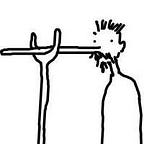Confucianism
Part philosophy, part social theory, and only part religion, Confucianism is based on teachings attributed to Confucius (孔夫子, Kǒng Fūzǐ, ‘Venerable Master Kǒng’, 551–479 BCE) and those of followers who developed his ideas, such as Mencius (孟子, Mèngzǐ, c. 372–289 BCE) and Xúnzǐ (荀子, c. 313–238 BCE). The ideas in these writings provided the framework in which the majority of Chinese philosophical thinking took place until modern times.
A key text is the Analects (论语, Lúnyǔ), a compilation of Confucius’s conversations and pronouncements, made by his followers. This, with the book of Mencius and two other Confucian-interpreted classics, eventually came to be studied in schools and became the canon upon which candidates for administrative posts were tested. Although Confucianism at times lost its place as the orthodox ideology, it was only at the termination of the examination system in 1905 that its influence on government began to wane.
A key idea was that the hierarchy of society reflected a natural moral order: patriarch as head of family, prince as head of state. State ceremonial and domestic ritual demonstrated the subservience of inferiors to superiors, and observance of these rituals helped to ensure the harmonious operation of society.
The prince, so long as he behaved morally, held the ‘mandate of heaven’, the source of his legitimacy. As with other moral beings, his behaviour would demonstrate rén (仁), a benevolent mixture of filial piety, loyalty, friendship, courtesy, reliability and a general ‘do as you would be done by’ reciprocal altruism.
In the elaboration of Confucian thought by Mencius, human nature was held to be fundamentally good, but creating the conditions for its nurture was the responsibility of the individual and above all of the ruler.
Later interpretations, often known as neo-Confucianism, saw daoist and Buddhist concepts (such as that of the ‘way’) replace some of the original more mechanistic ideas.
In the centuries following Confucius’s death, in which states contended for the overall mastery of China, it was argued by Confucians that only a Confucian ruler would succeed in unifying the country, but China’s first unification took place under the anti-Confucian Qín (221–206 BCE). However, Confucianism was adopted as the orthodox state ideology under the following Hàn dynasty. The Táng (618–907 CE) began to build temples to Confucius that were used to display tablets commemorating the principal men of letters after their deaths.
There’s long been a tendency to take from Confucius what appeals and ignore the rest. The Jesuits, who were responsible for Latinising Confucius’s name and introducing him to the West, liked his paternalistic family values. Some authoritarian Asian leaders have made Confucius the core of the ‘Asian values’ that were supposed to have driven the region’s economic success, in an attempt to legitimise their own undemocratic positions.
But Confucius regarded it as a moral duty to tell rulers the truth, and it’s doubtful whether he himself would have been a Confucian as the word is understood by touchy modern autocrats.
Excoriated by the communists for a few decades, he was first quietly rehabilitated, and then in 1999 they organised celebrations of the 2550th anniversary of his birth, with similar celebrations since. As their haphazard progress toward partial capitalism (‘socialism with Chinese characteristics’) produces an increasing amount of unrest among those missing out on the benefits, any support for authoritarian government is welcome, although the chances of the Communist Party allowing any independent criticism of the kind of which Confucius would have approved are slim indeed.
Nevertheless, his name has now been hijacked for a politicised policy of ‘soft power’ diplomacy. This, while promoting the study of Mandarin and Chinese culture, does so partly with the aims of also promoting the official highly distorted pro-Party view of Chinese history and political legitimacy, of reminding Chinese overseas that Hàn Chinese are superior to everyone else, and of making Chinese patriotism synonymous with support for the Party and its view of history. More than 100 government-funded ‘Confucius Institutes’ have opened around the world since 2003. Many are hosted by otherwise august and independently minded institutions that ought to be asking more about the Chinese government’s motivation and less about the cash on offer, and questioning the implied similarity of these arrangements to those of the British Council, Goethe-Institut, or Alliance Française.
Poor Confucius: from deity to pariah to political puppet in only 50 years.
See Confucius Temple and Imperial College where the emperors once lectured on the Confucian classics, and where those graduating from the highest level of Confucian examinations—the country’s administrators—were honoured. See also Civil Service Examinations.
Next in North and East of the Imperial City: Dì Tán Park
Previously: Civil Service Examinations (story)
Main Index of A Better Guide to Beijing.
For discussion of China travel, see The Oriental-List.
